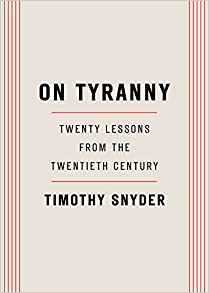 Timothy Snyder, On Tyranny: Twenty Lessons from the Twentieth Century (New York: Tim Duggan Books, 2017), 126pp.
Timothy Snyder, On Tyranny: Twenty Lessons from the Twentieth Century (New York: Tim Duggan Books, 2017), 126pp.
Timothy Snyder's little book originated as a post on Facebook that went viral, became a book, and ended up #1 on the NYT best seller list. Snyder, the Levin Professor of History at Yale University, speaks five languages, has a reading knowledge of five more languages, and is an expert on Eastern Europe — which is to say that he knows the meaning of tyranny. "The European history of the twentieth century," writes Snyder, "shows us that societies can break, democracies can fall, ethics can collapse, and ordinary men can find themselves standing over death pits with guns in their hands. It would serve us well to understand why."
Snyder gives us a grocery list of lessons from Europe's dark history that are meant to warn us of the illusion of American exceptionalism. Some of them are macro-institutional, like #2: "Defend institutions." Others are micro-personal, like #12: "Make eye contact and small talk;" or #14: "Establish a private life."
I was especially taken by #9: "Be kind to our language;" and #17: "Listen for dangerous words." The day that I finished this book the Washington Post (December 15, 2017) reported that "the Trump administration is prohibiting officials at the nation’s top public health agency from using a list of seven words or phrases in official documents being prepared for next year’s budget."
"Policy analysts at the Centers for Disease Control and Prevention in Atlanta were told of the list of forbidden terms at a meeting Thursday with senior CDC officials who oversee the budget, according to an analyst who took part in the 90-minute briefing. The forbidden terms are 'vulnerable, 'entitlement, 'diversity,' 'transgender,' 'fetus,' 'evidence-based' and 'science-based.'"
A few critics think that Snyder is too alarmist. Others believe he's the canary in the coal mine. You can decide for yourself. Whatever the case, "eternal vigilance," observed our founding fathers, "is the price of liberty." Synder's book reminded me of another important manifesto, the little forty-pager by the concentration camp survivor Stephane Hessel, Time for Outrage: Indignez-vous! (New York: Hachette, 2011).


